Smart contracts, Ethereum, and solidity
Goal: Be excited about smart contracts and wanting to write one
Smart contracts
Break
Smart contracts and Ethereum
Break
Hacks and examples
Agenda
45min
45min
30min
15min
15min
Smart contracts
Agenda
Nick Szabo
What is a smart contracts ?
What is a contract ?
What are smart contracts ?
Relation with traditional law
Why ?
Exampels
Failures
Comparison
Complexity
Summary
Conclusion
Nick Szabo
Nick Szabo
What is a contract ?
What are smart contracts ?
Relation with traditional law
Why ?
Examples
Failures
Comparison
Complexity
Summary
Conclusion

What is a smart contract?
What is a contract?
Nick Szabo
What is a contract ?
What is a smart contract ?
Relation with traditional law
Why ?
Examples
Failures
Comparison
Complexity
Summary
Conclusion
Contracts
What are they ?





Contracts
What are they ?
/stock-market-investing-in-stocks-57a25d785f9b589aa932fa0a.jpg)



What are smart contracts ?
Nick Szabo
What is a contract ?
What are smart contracts ?
Relation with traditional law
Why ?
Examples
Failures
Comparison
Complexity
Summary
Conclusion
The idea with a smart contract is that we’re totally defining the rules of our agreement in code
Smart Contracts
What is it ?
"New institutions, and new ways to formalize the relationships that make up these institutions, are now made possible by the digital revolution. I call these new contracts "smart", because they are far more functional than their inanimate paper-based ancestors. No use of artificial intelligence is implied. A smart contract is a set of promises, specified in digital form, including protocols within which the parties perform on these promises." -Nick Szabo, The idea of Smart Contracts
Smart Contracts
What is it ?
Smart Contracts
What is it ?
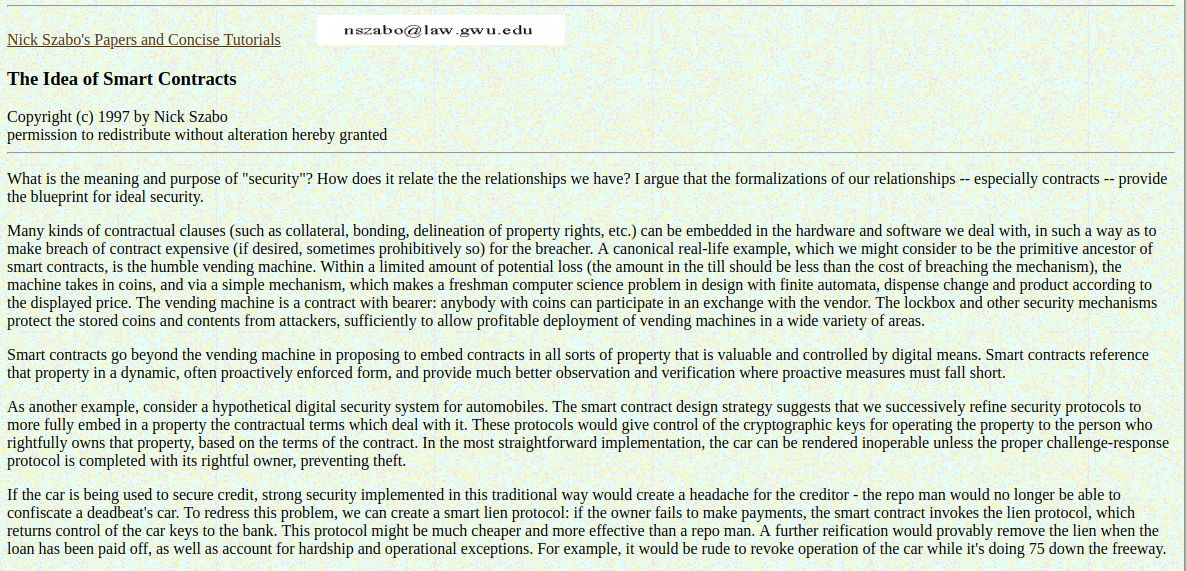


Smart Contracts
What is it ?



Smart Contracts
What is it ?


Smart Contracts
What is it ?
Any property that can be represented digitally can be managed with smart contracts
Difficult
Smart Contracts
What is it ?
Smart Contracts
What is it ?
"a contract is a program that runs on the brains of lawyers" - Nick Szabo
Relation to traditioal law
Nick Szabo
What is a contract ?
What are smart contracts ?
Relation with traditional law
Why ?
Examples
Failures
Comparison
Complexity
Summary
Conclusion
Smart Contracts
Relation with traditional law
source: Szabos
- Smart contract similar to the repo man, its a security protocol that controls the burden of lawsuit
-
If "possession is 9/10 of the law" then crossborder blockchain-based financial smart contract may be 99% of the law
- Do smart contracts need to be legally enforceable ?
-
Traditional contracts, interpreted by brain -> Wet code
-
Smart contracts are interpreted by a machine -> Dry code
-
Fiduciary(trust) vs Fiduciary Process (smart contract)
Why ?
Nick Szabo
What is a contract ?
What are smart contracts ?
Relation with traditional law
Why ?
Examples
Failures
Comparison
Complexity
Summary
Conclusion
Smart contracts
Why ?
- Secure a wide variety of things
- Cost of trust and security
- Trust minimization (e.g send bitcoin does not need a fiduciary)
- Minimize trust assumptions
- Centralization is insecure
Smart Contracts
Centralization is insecure


Smart Contracts
Public and global
source: bitcoinmap


Bitcoin
Etherium
Examples
Nick Szabo
What is a contract ?
What are smart contracts ?
Relation with traditional law
Why ?
Examples
Failures
Comparison
Complexity
Summary
Conclusion
Smart contracts
Exampels
- Dispute mediation
- Oracles
- Smart property
- Tokens
- Financial derivatives
- Social sites
- DNS
- Atomic swaps
- etc ...
Dispute mediation
Oracles
Smart property



Locks
Financial derivatives
contract
1000usd/eth
1000usd/eth
USD/ETH
1000usd/eth
REST
Social sites
Oracle
Etherium
Pay bob 10 eth
Address: 123....
balance: 5eth
accounts:
reddit: note89
twitter: note89
DNS
(name, ip)[]

Failures
Nick Szabo
What is a contract ?
What are smart contracts ?
Relation with traditional law
Why ?
Examples
Failures
Comparison
Complexity
Summary
Conclusion
Smart contracts
Failures
Insurrance claims and other very wet code heavy tasks

Comparison
Nick Szabo
What is a contract ?
What are smart contracts ?
Relation with traditional law
Why ?
Examples
Failures
Comparison
Complexity
Summary
Conclusion
Smart contracts
Comparison
| Law | Software | |
|---|---|---|
| Reasoning method | subjective minds, analogy | boolean logic, bits |
| Security | imprisonment / Contempt | replication + cryptography |
| Predictability | flexible | rigid |
| Matuiry | highly evolved / many cases | infantile / few examples |
Smart contracts
Comparison
| Law | Software | |
|---|---|---|
| Area | jurisdictional silos | (on the blockchain) independent from institutions and politics, seamless across boarders |
| Costs | Lawsuits/expensive | very low |
Complexity
Nick Szabo
What is a contract ?
What are smart contracts ?
Relation with traditional law
Why ?
Examples
Failures
Comparison
Complexity
Summary
Conclusion
Summary & conclusion
Smart contracts on Ethereum
Agenda
The state of things
Intro
History
Ethereum
Accounts
Messages and transactions
Ethereum state transition function
Gas
Storage, memory the stack
Messages
Delegate call
Logs
Create
Destruct
Misc
------ Part 3
Examples
Hacks
The Dao
Parity
EC20 Smart Contracts
The state of things now


Instituions
Operation



Instituions
Contention

Instituions
Authority


Blockchain has solved the issue of multiparty contention without having to involve a human.
Trust is no longer needed to interact with a third-party.

Ethereum
Build unstoppable applications
Ethereum is a decentralized platform that runs smart contracts: applications that run exactly as programmed without any possibility of downtime, censorship, fraud or third-party interference.
Etherium
Etherium is a very slow and expensive world computer
Commodities Trust
Turing-complete language
Ultimate abstract foundation layer
First class smart contract support
Value awareness
Blockchain-awareness
State

- 2013 proposed by Vitalik Buterin
- Crowdsale July to August 2014
- ~18 million dollars for 11.9 million coins
- June 2016 The Dao Hack
- Juli hard fork
- 13 000% increase 2017
- General purpose
Intro
History
- Decentralized digital currency around for a long time
- digicash 80s
- b-money 90s
- First with the idea of computer puzzles
- PayPal
- reusable proof of work 2005
- 2009 Bitcoin
- proof of work
- moderately effective consensus algo
- free entry
- proof of work
- proof of stake
History
Bitcoin


APPLY(S,TX) -> S' or ERROR
History
Mining
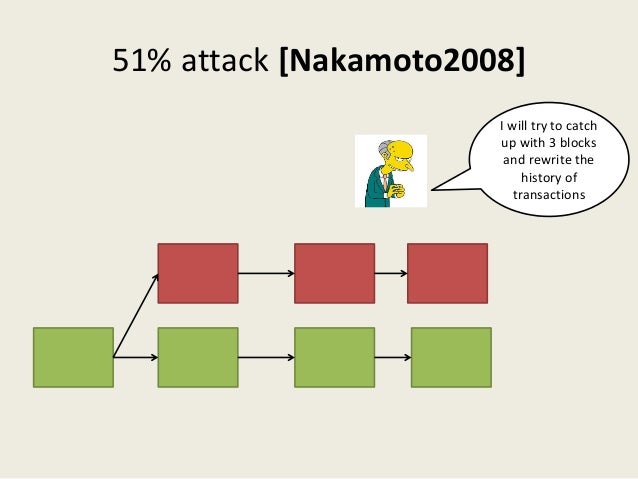
History
Alternative blockchains
- Namecoin
- Colored coins
- Metacoins
History
Scripting
- Bitcoinscript allows for weak version of smart contracts
- Multisignature can be implemented
- Atomic swaps
"This Bitcoin UTXO is yours if you can provide an SPV proof that you sent a Dogecoin transaction of this denomination to me"
History
Scripting
- Lack of Turing-completeness - loops missing
- Value-blindness
- Lack of state
- Blockchain-blindness
History
Summary
Three approaches to building advanced applications on top of cryptocurrency
- New blockchain
- Using scripting on top of Bitcoin
- Building a meta-protocol
Ethereum
EVM
Ethereum virtual machine
Runtime environment for smart contracts
Sandboxed and isolated
No access to network, filesystem or other processes, limited access to other smart contracts
Etherium
Accounts
/https%253A%252F%252Fblueprint-api-production.s3.amazonaws.com%252Fuploads%252Fcard%252Fimage%252F606054%252Ff5ce8db1-3094-48d4-a9c7-4c9364125ec0.jpg)
External accounts
Contract accounts
public key
creator address + nonce
address
storage
key-value 256-bit words
key-value 256-bit words
balance
wei
wei
code
no
Yes
Etherium
Messages and Transactions
A Transaction is a message from one account to another
Might be the same or special zero-account
address 0 creates a contract
Etherium
Messages and Transactions
- The recipient of the message
- A signature identifying the sender
- The amount of ether to transfer from the sender to the recipient
- An optional data field
- A STARTGAS value, representing the maximum number of computational steps the transaction execution is allowed to take
- A GASPRICE value, representing the fee the sender pays per computational step
Etherium
Ethereum state transition function
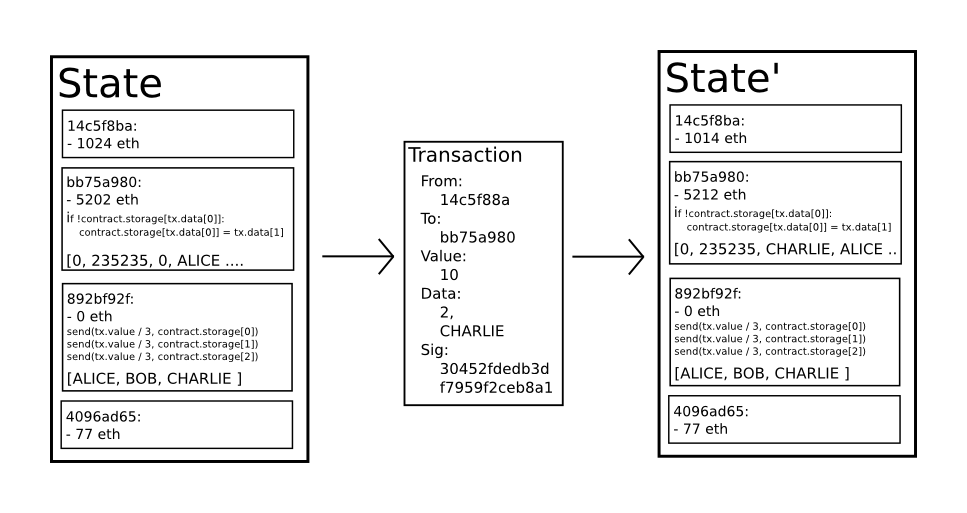
Etherium
GAS
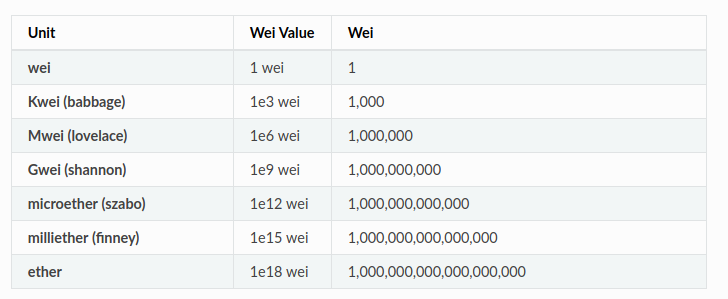
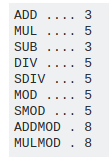
Etherium
Storage, memory and the Stack
-
Storage
- 256-bit words
- persistent
- not possible to enumerate
- costly to read
- even more costly to write
- only read and write to own storage
-
Memory
- cleared of every message call
- Linear, addressed at byte level
- reads limited to width of 256-bit
- expanded in chunks of 256-bit
- must be paid at time of expansion
- Memory more costly the larger it is scales quadratically
Etherium
Storage, memory and the Stack
Not a registry but a stack machine
It has a maximum size of 1024 elements and contains words of 256 bits
- Access to stack limited to top end
- copy one of the topmost 16 elements to the top
- swap the topmost element with one of the 16 below it
- Other operations combine topmost two elements from the stack and push the result back
Etherium
Storage, memory and the Stack
Possible to move stack element to storage or memory, but not possible to access aribtrary elements deeper in the stack without first removeing the top stack
Etherium
Instruction set
Instructions for EVM are keept at minimal to avoid incorrect implementations which could cause concensus problems.
All operations operate on basic datatype 256-bit words.
Artichmatic, bit, logical and comparison operators are present. conditional and unconditional jumps are possible.
Contracts can access relevant properties of current block like number and timestamp
Etherium
Messages
Similar to transactions
Contracts can call other contracts or send ETH to non contract accounts by means of message calls.
A contract can decide how much of its remaning gas should be sent with inner message call.
The Called contract(can be same) will have cleared memory and access to the call payload(calldata). After finished execution it can return data to caller.
Etherium
Messages
Calls are limited to a depth of 1024, so for more complex operations loops should be preferred over recursive calls.
Etherium
Delegatecall/Callcode and Libraries
There exists a special variant of a message call, named delegatecall. same as message call just that the the target address will be called in same context as the call calling contract and msg.sender and msg.value do not change their values.
Means we can dynamically load code from diffrent addresses at runtime. only code is taken from the called address.
Makes librarys possible
Etherium
Logs
Possible to store data in specially indexed data structure that maps up to blocklevel. Called logs and is used by for example Solidity to implement events.
Contracts cannot access log data after it has been created. But can be efficiently accessed from outside the blockchain. some of the logs are stored in bloom filters, makes it possible to search it fast and cryptographically secure. You dont need to download the whole blockchain so light clients can still find this logs.
Etherium
Create
Even contracts can create contracts
opcode or 0 address
Etherium
Self-destruct
The only possibility that code is removed from the blockhchain is when a contract performs the selfdestruct operation.
EXAMPLES
pragma solidity ^0.4.0;
contract SimpleStorage {
uint storedData;
function set(uint x) public {
storedData = x;
}
function get() public constant returns (uint) {
return storedData;
}
}Storage
pragma solidity ^0.4.0;
contract Coin {
// The keyword "public" makes those variables
// readable from outside.
address public minter;
mapping (address => uint) public balances;
// Events allow light clients to react on
// changes efficiently.
event Sent(address from, address to, uint amount);
// This is the constructor whose code is
// run only when the contract is created.
function Coin() public {
minter = msg.sender;
}
function mint(address receiver, uint amount) public {
if (msg.sender != minter) return;
balances[receiver] += amount;
}
function send(address receiver, uint amount) public {
if (balances[msg.sender] < amount) return;
balances[msg.sender] -= amount;
balances[receiver] += amount;
Sent(msg.sender, receiver, amount);
}
}Subcurrency
Coin.Sent().watch({}, '', function(error, result) {
if (!error) {
console.log("Coin transfer: " + result.args.amount +
" coins were sent from " + result.args.from +
" to " + result.args.to + ".");
console.log("Balances now:\n" +
"Sender: " + Coin.balances.call(result.args.from) +
"Receiver: " + Coin.balances.call(result.args.to));
}
})Subcurrency
HACKS!
The DAO Hack

50 MILLION DOLLARS!





How the DAO spends money
- Contractor submits a proposal
- Token-holders vote on the proposal
- Accepted proposals are sent ETH
Slock.IT

The Dao, May
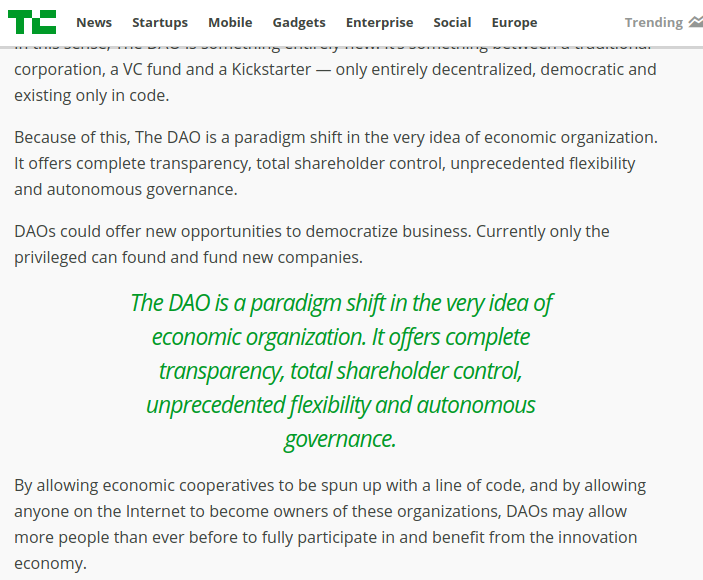
JUNE! HACK!
The Dao Hack, June

FORK ? ACCEPT ?
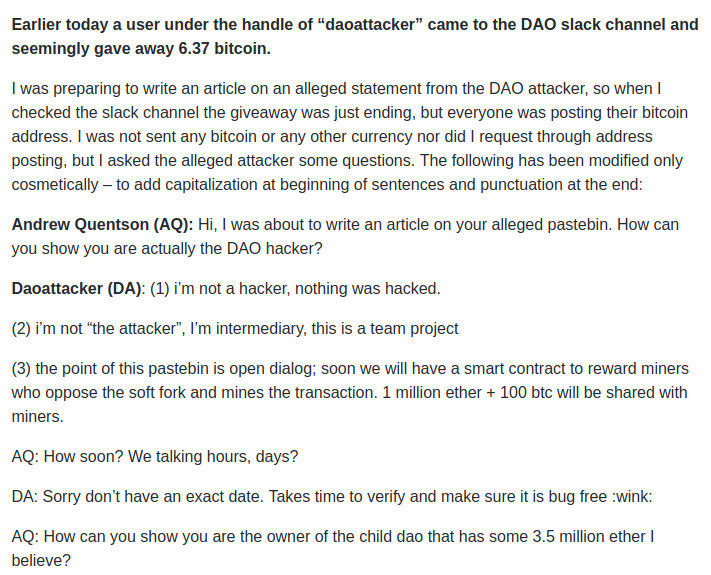
FORK!
What was the bug ?
function splitDAO(
uint _proposalID,
address _newCurator
) noEther onlyTokenholders returns (bool _success) {
...
// Move ether and assign new Tokens. Notice how this is done first!
uint fundsToBeMoved =
(balances[msg.sender] * p.splitData[0].splitBalance) /
p.splitData[0].totalSupply;
// This is the line the attacker wants to run more than once
if (p.splitData[0].newDAO.createTokenProxy.value(fundsToBeMoved)(msg.sender) == false)
throw;
...
// Burn DAO Tokens
Transfer(msg.sender, 0, balances[msg.sender]);
withdrawRewardFor(msg.sender); // be nice, and get his rewards
// Notice the preceding line is critically before the next few
totalSupply -= balances[msg.sender];
balances[msg.sender] = 0;
paidOut[msg.sender] = 0;
return true;
}Hacks
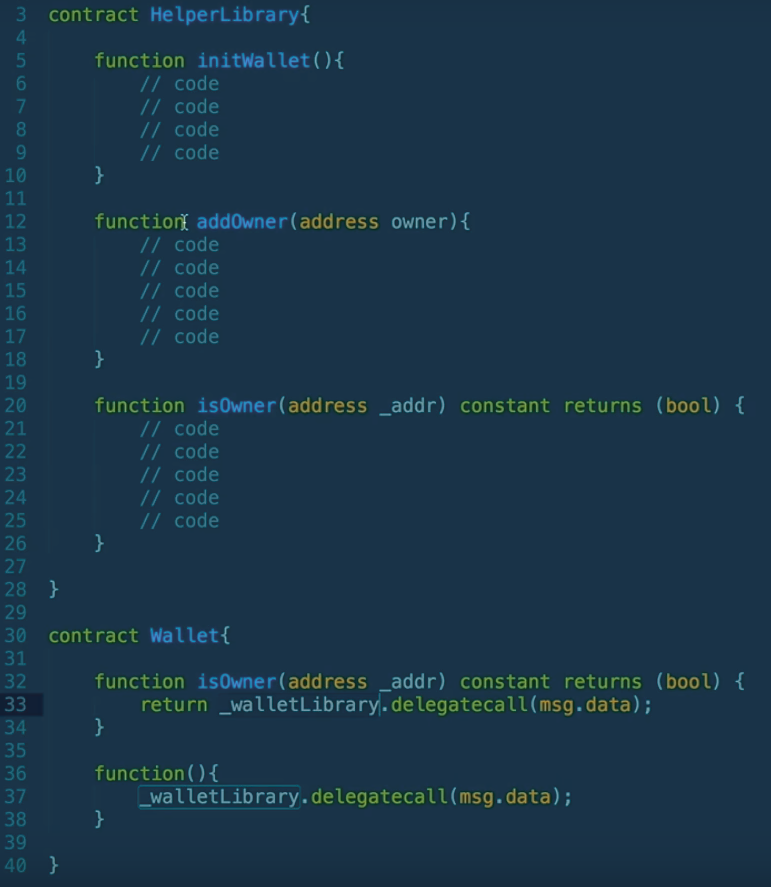
EC20 DEMO
Agenda
The state of things
Intro
History
Ethereum
Accounts
Messages and transactions
Ethereum state transition function
Gas
Storage, memory the stack
Messages
Delegate call
Logs
Create
Destruct
Misc
------ Part 3
Examples
Hacks
The Dao
Parity
Randomness
EC20 Smart Contracts
Smart contracts
By Nils Eriksson
Smart contracts
- 1,354



